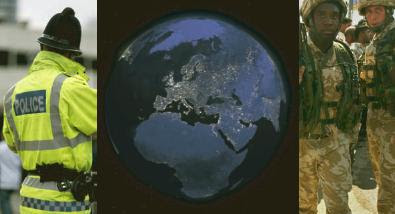
(Send in the Smurfs)
One year ago, the United Nations Security Council passed Resolution 1706, authorising up to 22,500 UN troops and police officers for a United Nations peacekeeping force with the power to use all necessary means to protect humanitarian aid workers and civilian populations, as well as to seize and dispose of illegal weapons.
The
new resolution agreed in New York, hailed by UN Secretary General Ban Ki-moon as "historic and unprecedented," makes no reference to this earlier resolution or to the Sudanese Government's refusal to comply with its provisions. It omits any condemnation of Sudan for failing to ensure humanitarian aid reaches those in need, deletes reference to evidence of violations of the UNSC-mandated arms embargo, removes a threat of UN sanctions in the event of continued non-compliance, and drops a request that the Secretary General immediately report any breach of this or previous resolutions and agreements.
Neither does the UN appear to have learned any lessons from last year's failed attempt to deploy UN peacekeepers in Darfur. The new "UNAMID" mission excludes adequate monitoring and enforcement mechanisms, is referred to as an "operation" rather than a "force," and will only be able to protect civilians deemed to be under threat.
Just last week, in its first overall review of Sudan's record for more than a decade, the
UN Human Rights Committee reported that "widespread and systematic serious human rights violations, including murder, rape, forced displacement and attacks against the civil population, have been and continue to be committed with total impunity throughout Sudan and particularly in Darfur." Without a political solution, UNAMID is destined to go the same way as Resolution 1706. As the new UN-AU mission head has commented, "I'm sure it will be one of the main tools for forwarding peace in Darfur, but it's only a peace operation — you need to have peace to keep."

One thing I find perplexing in recent media coverage is the assertion that this has been a four-year conflict. No mention appears to be made any longer of the previous two decades' violence by the Sudanese regime against its own people — as described by Baroness Cox in
A Voice for the Voiceless. The present genocide and obstruction of humanitarian efforts in Darfur differs very little from the bloody civil war that tore the country apart from 1983 to 2005, which resulted in the death of 1,900,000 civilians in southern Sudan, and forced more than 4,000,000 others to flee their homes.
 According to Environment Secretary Hilary Benn, the Bali roadmap is "a stark breakthrough." Really? Talks that have achieved "an extremely weak agreement" to start negotiations on a new pact to succeed the Kyoto Protocol are hardly going to change the world. Even their "groundbreaking agreement" on deforestation appears to amount to little more than agreement to include forest conservation in their future discussions. So much for the UN's "historic" climate deal.
According to Environment Secretary Hilary Benn, the Bali roadmap is "a stark breakthrough." Really? Talks that have achieved "an extremely weak agreement" to start negotiations on a new pact to succeed the Kyoto Protocol are hardly going to change the world. Even their "groundbreaking agreement" on deforestation appears to amount to little more than agreement to include forest conservation in their future discussions. So much for the UN's "historic" climate deal.![We know why you're in South Africa - Life in Zimbabwe is murder these days - Use your vote [Credit: Sokwanele]](http://farm2.static.flickr.com/1239/1366411450_320a35827e.jpg?v=0)

 Two generations ago, the United Nations promised in its
Two generations ago, the United Nations promised in its ![Containers being offloaded by Sudanese army soldiers from a Russian-supplied Antonov 12 freighter aircraft onto military trucks at the military apron of El Geneina airport [Credit: Amnesty International]](http://www.amnesty.org/images/resources/sudan/demorgan/Antonov_aircraft400x260.jpg)
![unexploded bomb in Sudan [Credit: DarfurGenocide.org]](http://www.darfurgenocide.org/images/travel/BombCut.jpg)


 Speaking to the
Speaking to the ![President Bush welcomes British Prime Minister Gordon Brown to the presidential retreat at Camp David [Credit: TimesUnion.com]](https://blogger.googleusercontent.com/img/b/R29vZ2xl/AVvXsEgL3s-li-4iK4i-z7ARCT_K1etU6BUWTAGfaXYVs0EoolPJdrx9ekWErJnTeD-QLUkLGfE-EXVF7g2nLnko3lFCVbbbPSzL8U3v9BHOD-Gt2Ub3ke9bU_UhYn7-K5i9Z3B-o-7caOkU9_Ni/s400/Bush-Brown.jpg)
 Almost before any of us have had a chance to digest Tuesday's report from the
Almost before any of us have had a chance to digest Tuesday's report from the ![Understanding of Poverty: What does it mean to be poor? [Credit: USAID]](http://www.usaid.gov/press/frontlines/fl_sept04/images/photos/surveys-3.jpg)
 Little wonder that Archbishop Pius Ncube of Bulawayo, previously nominated for the Nobel peace prize for his work in Zimbabwe, yesterday called upon Britain to "
Little wonder that Archbishop Pius Ncube of Bulawayo, previously nominated for the Nobel peace prize for his work in Zimbabwe, yesterday called upon Britain to " The chairman of the disreputable United Nations Human Rights Council has today presented its members with a "take-it-or-leave-it" ultimatum on a proposed new set of rules for how it will operate.
The chairman of the disreputable United Nations Human Rights Council has today presented its members with a "take-it-or-leave-it" ultimatum on a proposed new set of rules for how it will operate. Despite a decades-long conflict, an aerial survey in Southern Sudan has revealed that wildlife populations are thriving on an order that rivals the migrations of the Serengeti and could represent the biggest migration of large mammals on Earth.
Despite a decades-long conflict, an aerial survey in Southern Sudan has revealed that wildlife populations are thriving on an order that rivals the migrations of the Serengeti and could represent the biggest migration of large mammals on Earth.

